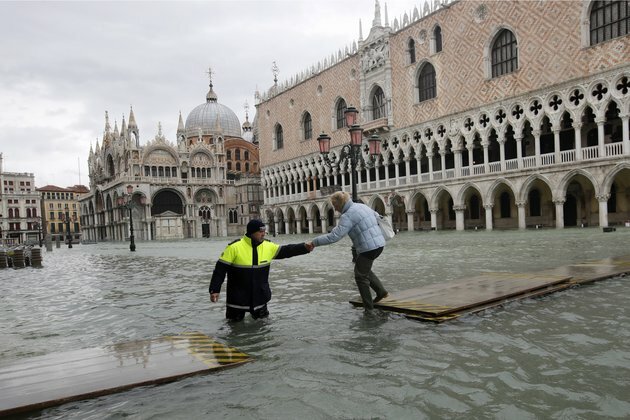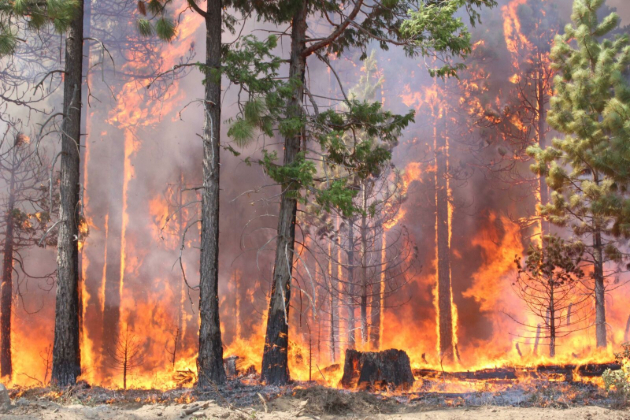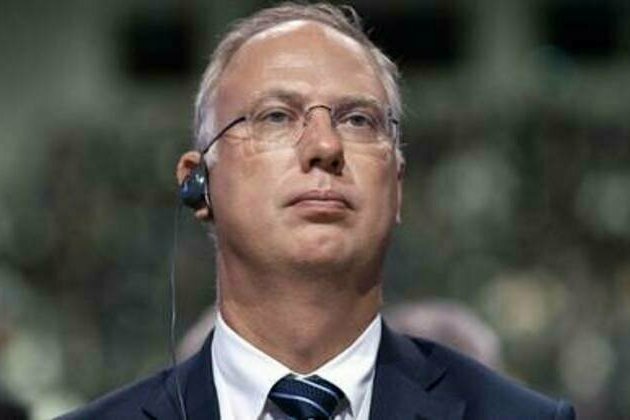Venice floods: Historical myths may attract the aid city needs
The Conversation
20 Nov 2019, 04:01 GMT+10

The city of Venice was recently hit by the worst flooding in more than 50 years. Water in the lagoon that surrounds the city rose 1.87 metres higher than normal, very close to the peak levels of the disastrous flood of Nov. 4, 1966. High winds of nearly 100 kilometres an hour made the situation even worse.
The city's pedestrian streets became rushing rivers of brackish water, boats were thrown onto walkways and the crypt of the basilica of San Marco was submerged. The damage is still being tallied, but the mayor currently estimates restoration costs at more than 1 billion euros. As a historian of Venice who has spent long periods living and working in the city, I followed the stories of the damage with growing sadness and dismay.
Then I reminded myself that the international community has always responded with great concern to cataclysms in Venice. Assistance from across the world in the aftermath of the 1966 flood allowed the restoration of dozens of damaged monuments, paintings and sculptures, as well as the creation of foundations that still work to benefit the city's artistic treasures.
Why does Venice attract so much international attention compared to other cities? I've been pondering this question. The city is an undeniably beautiful place, and many tourists remark on the haunting lights and sounds of a city built entirely on water, with no vehicular traffic.
But Venice is also a place with a long tradition of convincing outsiders of its uniqueness. This tradition may continue to shape the way the world sees the city today, and could be what ends up helping the city survive.
A city of great myths
Venice has long been known for its artistic, political and cultural achievements. During its centuries as an independent republic (from 1297 to 1797), it was one of the greatest economic and military powers in Europe. Venetian merchants (including Marco Polo) were famous for trading activities across Europe, the Mediterranean and Asia, and Venice's navy was supported by a huge and active shipyard, the Arsenal.
The government of the republic was also well-known for its early and extensive bureaucracy. As a consequence, the city's medieval and early modern archives are among the richest available anywhere in the world today.
But Venice also stands out because its inhabitants have a tradition of telling stories - some would say myths - that highlight its special status while obscuring some inconvenient truths. For instance, Venetians claim that the city was founded in the middle of the fifth century A.D. by mainland dwellers fleeing before invading hordes of "barbarians" - including Attila the Hun himself.
But archeologists have cast doubt on that tale since they have found that as early as the Bronze Age, people hunted and fished on the mudflats of the Venetian lagoon.
By the fifth century, at least one island in that watery region, Torcello, was home to a thriving community of several thousand inhabitants. More communities gradually took shape nearby, as inhabitants drained marshy land and built it up by driving thousands of wooden piles into the mud.
That prosaic tale of gradual development is overshadowed by the more dramatic story of flight and survival, which continues to be used to emphasize the special status of Venice within the Italian peninsula and in world history.
Another influential story the Venetians told about themselves in the Middle Ages was that of the republic as La Serenissima, or "the most serene." This "myth of Venice," as scholars call it, compared the harmony of Venetian civic life to the factionalism of other cities in Italy. It, too, is a fable that obscured real tensions within the republic.
Even the famously well-organized republican archives, a "fact" repeated by Venetian chancery officials and then scholars across centuries, has recently been shown to be more myth than reality. In fact, officials struggled to maintain professionalism within the archive as early as the 16th century.
Separate and special?
As I tell my undergraduate students, just because these stories are not entirely true does not mean they are unimportant. Quite the opposite: they show us what mattered to those who told them.
But they also contributed to a notion that Venice was separate and somehow special. In the responses to recent environmental catastrophes, we can see the positive and the negative effects of that longstanding belief.
On the one hand, Venice will probably get the international support it needs to embark on a huge cleanup and restoration effort. On the other hand, other storm-damaged communities in Italy that lack the Venetian "brand" might not receive the same assistance, especially from international organizations with substantial endowments.
Of course, restoring the historical treasures of Venice and ensuring that the city is safe from future catastrophe is important. It must happen. But if we look just a bit critically at why we think of Venice as exceptionally worthy of attention, we might find that Venetian myth-making has struck again.
[ Deep knowledge, daily. Sign up for The Conversation's newsletter. ]
Author: Roisin Cossar - Professor, Department of History, University of Manitoba 
 Share
Share
 Tweet
Tweet
 Share
Share
 Flip
Flip
 Email
Email
Watch latest videos
Subscribe and Follow
Get a daily dose of Irish Sun news through our daily email, its complimentary and keeps you fully up to date with world and business news as well.
News RELEASES
Publish news of your business, community or sports group, personnel appointments, major event and more by submitting a news release to Irish Sun.
More InformationInternational
SectionFDA, CDC, NIH face significant staff reductions, CMS less affected
WASHINGTON, D.C.: U.S. Secretary of Health and Human Services Robert F. Kennedy Jr. announced a significant restructuring of federal...
South Korea’s worst wildfires kill 28, destroy historic temples
ANDONG, South Korea: Wildfires in South Korea have doubled in size in just one day, making them the country's worst fire disaster....
Boeing to face trial this summer in 737 MAX fraud case
WASHINGTON, D.C.: Boeing is now heading to trial this summer, after a U.S. judge unexpectedly set a date in the criminal fraud case...
Wildfires rage in Carolinas as dry winds, downed trees fuel flames
RALEIGH/COLUMBIA: Dry weather, strong winds, and fallen trees from Hurricane Helene have sparked wildfires in North Carolina and South...
Red Cross outraged after killing of Gazan ambulance crews
GENEVA,.Switzerland - The International Federation of Red Cross and Red Crescent Societies (IFRC) has expressed profound outrage following...
Tesla to launch in Saudi Arabia next month after years of tension
RIYADH, Saudi Arabia: Tesla is finally entering Saudi Arabia, with a launch scheduled for next month—marking a significant shift in...
Europe
SectionApple faces record tax bill in Ireland despite profit surge
DUBLIN, Ireland: Apple's Irish headquarters shouldered a massive 23.2 billion euro corporation tax charge last year, largely due to...
Finance Ireland gets 700 million euros to boost auto, commercial loans
DUBLIN, Ireland: Finance Ireland has secured more than 700 million euros in funding to ramp up lending for cars and commercial property,...
Apple likely to escape EU fine after browser changes
BRUSSELS, Belgium: Apple appears to have dodged a major regulatory setback in Europe, following recent changes to how users select...
Ireland doubles community funding for Lebanon, Harris announces
DUBLIN, Ireland: Ireland will double its community funding for local projects in Lebanon, Tanaiste Simon Harris announced this week...
Visit by Putin envoy to Washington possible Kremlin
It was earlier reported in the Western media that Kirill Dmitriev will meet Donald Trumps Ukraine negotiator Steve Witkoff later this...
Visit by Putin envoy to Washington 'possible' - Kremlin
It was earlier reported in the Western media that Kirill Dmitriev will meet Donald Trump's Ukraine negotiator Steve Witkoff later this...













